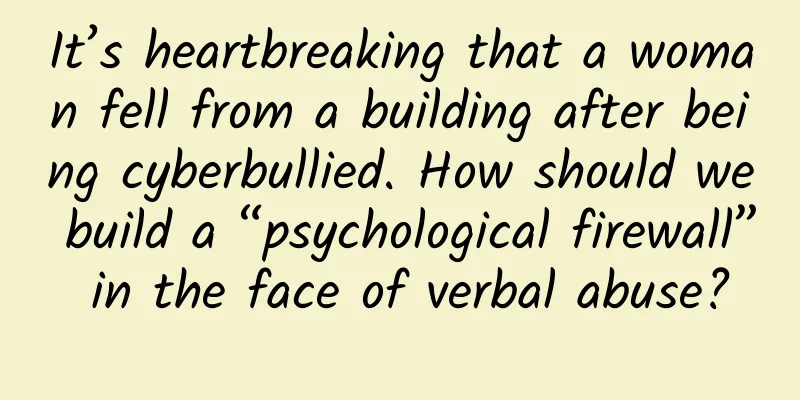It’s heartbreaking that a woman fell from a building after being cyberbullied. How should we build a “psychological firewall” in the face of verbal abuse?

|
It’s heartbreaking that a woman fell from a building after being cyberbullied. How should we build a “psychological firewall” in the face of verbal abuse? Original by Tang Yicheng Scientifically Refutes Rumors 2022-04-12 18:30 It started out as a heartwarming comedy about true love in the world, but ended with death amid the carnival of "keyboard warriors". This is a tragedy that happened in Shanghai recently. The matter was actually very simple and kind - due to the inconvenience of isolation due to the epidemic, a woman in Shanghai asked a delivery boy to deliver vegetables to her hearing-impaired father 27 kilometers away. Later, to express her gratitude, she topped up 200 yuan of phone bill for the delivery boy who said he would not accept any extra compensation. However, after the news spread, some "keyboard warriors" questioned the amount of money as too small, and even abused the woman online, and soon after that, the woman fell from the building. The husband of the deceased said that because his wife was usually timid and kind, she lost control of her emotions after being cyberbullied, so he was ready to use legal means to hold the parties involved accountable. Tuchong Creative After this sad and infuriating incident, people can't help but wonder, where do so many lawless "keyboard warriors" come from? How can kind people avoid being hurt by cyberbullying? This article will give you the answer. 01 Why are netizens so violent? Recently, there have been numerous cases of serious mental damage caused by cyberbullying, not to mention on domestic social media. There are also relevant data from abroad showing that 40% of American adults have suffered online abuse, and nearly half of them have been severely harassed, including physical threats and stalking. Why are people so violent on the Internet? Cyber violence refers to certain online behaviors by individuals or groups that attack the well-being of other individuals or groups, causing physical, psychological or emotional harm to others. Cyber violence covers a wide range. What we are mainly discussing today is group cyber violence based on social media and social networks, that is, the perpetrators are groups rather than individuals, and the violence occurs on public online media, such as Weibo, Moments, Zhihu, etc. The prevalence of cyberbullying stems from the fact that social media can facilitate people's malicious behavior. Yale University neuroscientist Molly Crockett's research focuses on how social emotions are transformed online, especially moral outrage. Tuchong Creative What is moral outrage? It's the anger people express when they encounter injustice and immorality. Brain imaging studies show that when people act on moral outrage, their brain reward centers are activated, which reinforces their behavior so they are more likely to intervene in a similar way again. So if they see someone behaving in a way that violates a social norm, like a dog urinating in public, they publicly confront the dog owner and feel good about it afterwards. Even though this may expose them to attack, it will also enhance their reputation. Similarly, people are particularly irritable online based on this mechanism. We have created an ecosystem online that favors the most angry content and a platform that makes it easier than ever to express anger. Recent studies have shown that messages containing moral and emotional words are more likely to spread on social media. Every moral or emotional word in a tweet increases the probability of being forwarded by 20%, which means that content expressing anger is more likely to be shared online. At the same time, expressing anger online is less risky. Unlike the offline world, the Internet is anonymous and virtual. Netizens do not need to interact with their real identities most of the time, and can even pretend to be someone else to comment and communicate. Therefore, when we abuse and accuse someone online, there is no personal risk, and we don’t have to worry about retaliation. As long as we close the webpage, everything will be fine. The most surprising thing is that scientists have found that social networks are even rewarding violent behavior. Jonathan Haidt, a professor of social psychology at the Stern School of Business at New York University, found through research that the reason why people embrace anger on social networks is that the expression on social networks is not essentially a form of communication or dialogue, but more like a public speech. Tuchong Creative Expressing anger, moral criticism, publicly humiliating opponents or highlighting emotional expressions are all proven effective strategies in public speeches, collectively known as "moral showmanship." He believes that the core of social interaction is two-way dialogue and communication, but speeches on social networks are largely one-way public performances. It is worth noting that this kind of "moral show" can easily go to extremes. Many netizens make unwarranted comments on the parties involved based on their so-called "sense of justice", hurting them and gaining a sense of superiority from standing on the moral high ground. This is a common psychological root cause of cyber violence. The above reasons lead to the fact that the cost of venting anger on the Internet is low and the reward is high. Even when faced with unconfirmed events, it is easy to "lose control of anger" and cause unwarranted harm to the parties involved. 02 Who is likely to become a victim of cyber violence? Victims of cyberbullying share some recurring common characteristics, including: Teens and young adults are at greatest risk of becoming victims of cyberbullying. In the cases of spreading false rumors and receiving explicit photos, women were more likely to be victims of cyberbullying. l People who identify as lesbian, gay, bisexual or transgender may be more likely to be victims of online bullying. People who are shy, socially awkward or have difficulty fitting in are more likely to become victims of cyberbullying. People from low-income families are more likely to be victims of cyberbullying. l People who use the Internet frequently are more likely to become victims of cyberbullying. Cyberbullying can have many negative effects on victims. It is helpful to understand what effects cyberbullying victims experience as a way to identify if someone is experiencing cyberbullying. Some of these effects can be even stronger than traditional violence, as victims of cyberbullying are often unable to escape from the situation in which they are being abused. 03 How to protect yourself from harm when faced with unwarranted abuse? As a victim of cyberbullying, there are many ways to deal with cyberbullying and build a "psychological firewall". First, be sure to keep records of all incidents of cyberbullying, whether they come from your text messages, WeChat, Weibo, or other online sources. Take screenshots of evidence of cyberbullying and save them in a folder on your computer. Next, if you know the source of the cyberbullying, determine if you can take appropriate action against the perpetrator. For example, if the perpetrator is a co-worker or supervisor at work, is there someone in HR you can talk to? If the perpetrator is a family member, is there a way to raise the issue with other family members and ask for their support? Finally, if the abuser is someone you only know online, can you block and delete them from all your social media? The best course of action is to ignore online abuse as much as possible. However, if you are threatened, you should report it to the police and attach the evidence you have collected. In addition to pursuing accountability through legal channels and striving to make cyber violence punishable by law, it is also very important for victims of cyber violence to actively and effectively protect their mental health. A 2012 study investigated this aspect. After a six-month follow-up survey of 765 Swiss teenagers, researchers found that, like real-life violence, cyberbullying can make victims more likely to suffer from depression; at the same time, even undiagnosed victims of cyberbullying will show more and more symptoms of depression over time. Tuchong Creative In the face of cyberbullying, the study summarizes and categorizes three types of coping methods that victims may choose: Actively seek support from relatives and friends, fight back against the perpetrators of violence online or in real life, or blame yourself and try to escape or ignore the existence of violence. Through statistical analysis, researchers found that actively seeking support from relatives and friends can effectively buffer the negative emotions brought to victims by cyber violence, but the other two coping methods - fighting back with violence and trying to ignore the existence of violence - are positively correlated with depression symptoms. Therefore, in the face of the negative emotions and depression risks brought about by cyberbullying, an effective way to deal with it is to actively seek support from people around you and chat with them. Whether it is "hard fight" or "submission and ostrich", it is likely to increase the risk of depression. Most importantly, all victims of cyberbullying need to understand that cyberbullying does not always have direct causes. Sometimes people attack others because of their own insecurities. Please remember that it is not your fault in any case. I hope that the Internet environment can become clearer, the platforms can take responsibility, and tragedies caused by cyberbullying will no longer happen. Author | Tang Yicheng China Science Popularization Mental Health Promotion Center Review | Fan Chunlei Associate Researcher, Institute of Psychology, Chinese Academy of Sciences Editor | Jiang Fan Editor | Ding Zong References [1] Akingbade, O., Peek, ME, & Tung, EL. (2021). Network size orproximity? association of network characteristics with violence-related stress and ptsd among racial/ethnic minorities in chicago. Journal of General InternalMedicine. [2] Luo, A. . (2018).Reflection and legal regulation of "network violence" under thediscourse democracy. Journal of Gannan Normal University. |
<<: Please note when you see this: Don’t cross your legs!
>>: What is a polygenic risk score? Will “scientific fortune-telling” be possible in the future?
Recommend
How much does it cost to join the Yichang Photo Mini Program?
How much does it cost to join the Yichang Photo M...
How to operate social e-commerce well?
We always say that when the wind blows, even pigs...
Lao Duan said: Internet TV calls for innovation in user experience
In the nearly 60 years since television was inven...
Apple saves Samsung once again, and the global OLED landscape officially begins
Speaking of OLED, the industry believes that it i...
A guide to creating a short video matrix for “Reading Books in Your Palm”!
I believe everyone is familiar with ZhanDuShu , w...
Canghai "Taobao Search" Taobao Mobile recommendation continues to increase the practical operation essential, simple and easy to learn, quickly master
Training course content: The main contents of the...
Why did human body temperature drop?
Why did human body temperature drop? Author: Fan ...
Durex for Halloween will make you ready to scream, and with the right creativity, demons and monsters can be transformed into cute pets in seconds!
Do you know? Halloween is a traditional Western f...
Keep, Gudong, and Yuepaoquan competitive product analysis report
Online sports are not like sports news portals or...
Google complies with EU regulations: provides Android users with 12 optional search engines
According to reports, Google announced today that...
Cortona becomes the main application Windows 10 anniversary update six highlights
Microsoft officially announced today that Windows ...
Taking CCTV and Google as examples, let’s talk about the mechanism design of bidding advertising!
Many people have two extreme views on competitive...
Inventory of essential tools for new media operations (dry goods collection)
We also need to arrange a good-looking layout How...
Is it difficult to write brand copywriting for the Dragon Boat Festival? Share 15 for your reference!
The Zongzi Festival on May 5th is coming soon. Th...
CP must see! Don’t miss every corner of the AppStore when tracking competitors!
As an App marketer or developer, competitor track...





![[Smart Farmers] How good are Chinese people at eating? The "shrimp tribe" on the table](/upload/images/67f23d2fb3ad1.webp)



